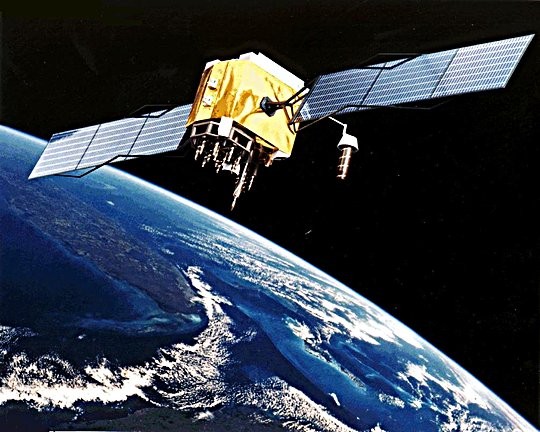
When Dan Reus thinks about the big picture, he's not thinking about the same canvas the rest of us are considering. Right now, he's not even on the same planet. Yet somehow, his most recent project, one that he hopes will end approximately 190 miles above Earth's surface, began with a meeting in a pub.
In January, Reus, the founder of local creative collective Openly Disruptive, met a man named Sandy Antunes in an Irish bar outside of Washington, D.C. The conversation was notable both because of who Antunes is and what he brought with him: part of a satellite. For years, Antunes used his degrees in astronomy and computational astrophysics in his work with NASA to launch the program's satellites into orbit. After four years spent on a launch that he never heard about again, Antunes decided to try it again, this time without government intervention.
Today, he is the founder of Project Calliope, a plan to launch a mini-satellite into space to collect data that can later be translated into music. It was Calliope that enticed Reus, a 44-year-old marketing consultant, to request the meeting. It is at this point that most people would become overwhelmed. It was at this point, however, that Reus thought, "I'll try that."
"Meeting him with that satellite piece was like being in a spy movie," Reus says. "His project is amazing, but where he was interested in the technology aspect, I was more interested in the community aspect and how to get more people involved and interested."
The result, rather unpredictably, is that there are now two separate projects devoted to launching satellites into space on small budgets without government participation only to create sound out of the data that results. The initial project belongs to a Maryland astronomer, and the second is helmed by a St. Louis native who jokes about his inability to do math in the morning. It's unclear how long we will have to wait until Disney adopts the plot, but in the meantime the project's structure is almost as rogue as its conception.
"The idea is if you want to be relevant in the future, you have to actually start on the future," Reus says. For him, that meant founding Openly Disruptive, what is ostensibly a nonprofit without the official responsibilities or the ties to the government Reus is aggressively hoping to avoid. "It was important to get it started without a board of directors and all that officialness that comes with so much overhead when we didn't really know what we were doing yet."
This much we do know: Right now, the satellite is fiction, but its eventual realization depends entirely upon donations to its plight made on kickstarter.com. In a perplexing insight into reality, the initial materials for the satellite --the launch slot, the raw parts and the devices used to communicate with it -- will be purchases for $8,300 through PayPal. The rest of the satellite's $20,000 total budget will be allotted to funding projects inspired by the data and completing the actual creation of the satellite.
Despite its lofty intentions, the mission is as grassroots as they come. Reus is partnering with a local hacker space, (people who like to put things together) Arch Reactor, for the design of the satellite, and a local disaster preparedness organization, Zombie Squad (people who spend a lot of time preparing for the zombie apocalypse) on training for the eventual task of communicating with the satellite.
"This is such a low-cost thing that it's almost like shooting it up in a big bottle rocket," Reus says. "If everything works correctly, it will stay up for a couple months before re-entering the atmosphere. If it stays up more than three months, it will be a miracle."
Once launched into outerspace, the as-of-yet-science-fictional satellite will spend its time collecting a variety of data from a height of 190 miles above St. Louis and all of the other cities not aware of its existence.
"You'll see how temperatures change as you go across the Earth, how fast the satellite is moving and where it's spinning and the pressure of the atmosphere and all of these different dimensions of space that you can find out from even a project as small as this one," Reus says. He sighs. "We'll just learn what it's like, vicariously, to be 190 miles over the Earth."
This data includes temperature reads, light levels and fluctuations in speed as it tumbles through its rotation hopefully without becoming space debris. Translating those numbers into sound is the easy part, says Reus, though it's the more difficult aspect to explain.
"If you look at the data like a graph from high school algebra, there are points going up and down, up and down, up and down," Reus says. "That doesn't make a sound, clearly, but if you compress that signal to be vibrations in a range that corresponds to human sound, you've got the makings for music and art. Lots of people get an emotional feeling and learn something from music, and this is a great way to explore space."
The eventual goal, once the entire plan has been firmly placed into the works, is to make the data available online for anyone interested in it. The incoming data will be uploaded on a daily basis, and a large portion of the money targeted in Reus' fundraising efforts will be devoted toward grants for local brains to create their own projects based on that data.
But in the meantime, the project is lodged rigidly on the ground. Kickstarter can launch the satellite, but it can also function much like gravity: If the project is unable to guarantee the entire $20,000 attached to it budget in the five days before its time on the site runs out, none of the money pledged so far will make it past the hypothetical stage. Right now, the project has earned $535 in pledges, but Reus has not begun to despair. Not yet.
"Almost all of the funds on kickstarter get raised in the last week," Reus says. "Would I like that have most of the money already there? Absolutely, but I'm still optimistic. If it doesn't work out, we'll be doing a lot of carwashes and bake sales."





